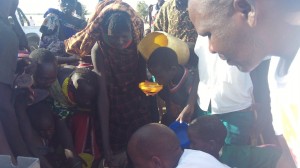 When I first studied philosophy at Texas Tech, I was introduced to a pre-Socratic philosopher name Thales. Many have considered him the first of Western philosophers, and some even call him the “father of science.” But what I remember most about him is “water.” In fact, he said, “Water constituted the principle of all things.” He could have easily been where I have been in Africa recently. Over here, they just say, “Water is life.”
When I first studied philosophy at Texas Tech, I was introduced to a pre-Socratic philosopher name Thales. Many have considered him the first of Western philosophers, and some even call him the “father of science.” But what I remember most about him is “water.” In fact, he said, “Water constituted the principle of all things.” He could have easily been where I have been in Africa recently. Over here, they just say, “Water is life.”
I can’t tell you how many times and how many places I heard this—“Water is life.”
We were involved in drilling water wells in Turkana, Barwessa, and Bungoma. In all three places, they repeated the source of life. Water, in and of itself, is critical. But I never understood the domino effect of water. Let me see if I can explain it.
We drilled a well in Turkana. The nearest water previously was a day’s journey from where the people were located. So now they have good water to drink that is near them. But that’s not all. Some have called this drought—“the children’s famine” because of the way it has produced so many orphans. And when I looked under a tree near the water, I saw around a hundred little children. Yes, they were orphans from the famine. And people had just dumped them there because they thought the most likely place for someone to take care of them would be near the water. So now we had a little orphanage going because we brought water. And obviously this was the best place for us to bring food. So now the orphans along with others were getting food and water. One woman upon seeing all of the little children decided to start teaching them. She asked us if we would buy her a blackboard. We did. So now in the middle of the desert is a blackboard under a tree with a woman teaching vowels to a bunch of little kids. We now have a school. The chief showed up and noticed all the water, food, children, blackboard, and the general good spirit around the place. He thanked us. He said that Christianity was good. After seeing the love expressed there, he believed that the message of Christ was true. He wanted all of his community to become Christians. Now there is a church. We still don’t have a school or church building yet, but that is not the most important part of a church or school. The chief decided that we had helped so much that he should do something in return. He gave us a bunch of land. Since we now have water, we are irrigating the land. Now there is a farm. Soon there will be food that we didn’t bring. We invited the people to start farming our land. We will pay them with the food produced on the farm. Now there are jobs. In fact, there is an economy. And a bunch of goats started coming while we were standing there and began drinking the water. Now there is livestock. We have a ranch. One of the elders told me that with this new water, people don’t get typhoid like they did in the past. Now there is health. People decided that this place was a good place to be. They discussed moving to this spot. Soon, there will be a town.
It all started one day when someone was watching the news on television and then asked me, “Is there any way we can get them water?” And then she decided to fund a well. It started quite an effect—didn’t it?
Water is life.

